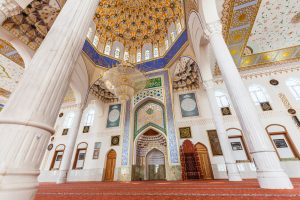The United Nations Special Rapporteur on freedom of religion or belief, Nazila Ghanea, completed her first official country visit last week, to Tajikistan. This visit comes nearly two years after her predecessor canceled a planned trip to the country after the government failed to extend an official invitation. Ghanea’s visit is a fresh opportunity for Tajikistan to address its many shortcomings on protecting the fundamental right of freedom of religion or belief.
Since 2012, the United States Commission on International Religious Freedom (USCIRF) has recommended that the U.S. Department of State designate Tajikistan as a “Country of Particular Concern” or CPC, for its systematic, ongoing, and egregious violations of religious freedom. The State Department has designated it as a CPC since 2016, most recently in November 2022.
In 2009, religious freedom in Tajikistan declined sharply after the government’s adoption of several highly restrictive laws. Religious groups suddenly had to undergo a more burdensome and intrusive registration process that, if denied, rendered their religious activities illegal and meant great personal risk of fines or even prison. Even more shocking for families was a ban on children participating in any organized religious activities such as prayers or education.
Today, the government continues to control and surveil all religious activity, including publishing or selling religious literature, wearing religious clothing, and other outward expressions of devotion. It also represses religious freedom in the guise of “extremism” charges leveled at individuals for the nonviolent practice of their faith. For example, last July Imam Muzaffar Davlatmirov was detained, hastily charged, and then convicted in a secret trial for “public calls for extremist activity” after he held funeral prayers for protesters killed by the government. He was sentenced to five years in prison. Similarly, authorities have imprisoned Jehovah’s Witness Shamil Khakimov since 2019 on spurious charges of “inciting religious hatred.”
Over the past decade, Tajikistan’s repression of religion has most widely affected the majority Sunni Muslim population. In the past year, however, the government has newly cracked down on the Ismaili Shi’a Muslim minority, closing religious schools and bookshops and enforcing bans on private prayer meetings. In addition, the country’s small Christian population finds it difficult to register their communities and so are forced to worship in secret.
The U.N. Special Rapporteur’s visit to the country offers an opportunity to better understand the conditions facing religious communities in Tajikistan.
Engagement with the U.N. Special Rapporteur and other international actors has played a key role in advancing freedom of religion or belief elsewhere in the region. For example, in 2017, Uzbekistan welcomed the visit of then-Special Rapporteur Ahmed Shaheed, whose recommendations to improve the country’s religious freedom landscape led the Uzbek government to adopt a “road map” for reform. Uzbekistan largely ended police raids on religious minorities, consulted with international experts to revise its own problematic religion law, and eased some restrictions on religious groups’ ability to practice and express their beliefs. Although Uzbekistan continues to severely violate religious freedom — most notably by imprisoning Muslims for “unauthorized” religious activities — leading to USCIRF’s continued recommendation for its inclusion on the State Department’s Special Watch List (SWL), its government has nonetheless made perceptible progress that will hopefully continue.
Similarly, since 2019 Kazakhstan has engaged with the United States on these issues through the U.S.-Kazakhstan Religious Freedom Working Group, a forum for discussions on its restrictive legislation, religious prisoners of conscience, and the targeting of individuals who do not adhere to “traditional” religions or state-sanctioned Islam. Most recently, the working group provided extensive feedback on amendments to the country’s 2011 religion law that contributed to some modest changes. USCIRF continues to encourage the government of Kazakhstan to adopt additional amendments with the wide-ranging changes necessary to comply with international human rights standards. While Kazakhstan continues to engage in conversations with international actors, including USCIRF, its reforms to date remain insufficient for USCIRF to discontinue recommending its inclusion on the SWL as well.
Ample room remains for Central Asian countries to reform their respective spaces for freedom of religion or belief, and engagement on these key issues is an important first step. Tajikistan’s willingness to host the Special Rapporteur offers the government a unique opportunity to receive recommendations from an independent expert, reassess its practices, and bring its policies in line with international human rights standards. Doing so would be in the government’s self-interest and would benefit those who simply seek to worship freely and without fear in Tajikistan.

































